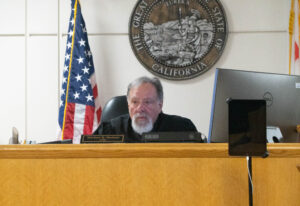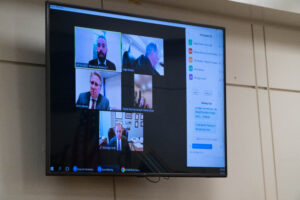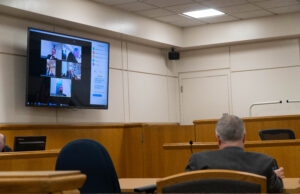After an hour-long hearing in the Tulare County Superior Court’s Juvenile Division, the Tulare County District Attorney’s office earned slightly more time to respond to claims by three former Tulare hospital leaders who say they are being unfairly prosecuted.
The trio are specifically seeking the recusal of District Attorney Tim Ward and the entire Tulare County District Attorney’s Office, based on allegations that Ward was friends with the lead defendant before allegedly following shifting political winds and prosecuting him.

At the hearing on Wednesday, January 4, Judge Michael Sheltzer extended the deadline for the district attorney’s office and the California Attorney General’s office to respond to the bias claims to January 31, from an initial January 9 date. A new hearing date of March 13 has been set, at a location to be determined.
In court filings, the office had asked for a later deadline around the week of February 13, stating that attorneys for Dr. Yorai ‘Benny’ Benzeevi, Alan Germany and Bruce Greene said they would file a 50-page motion for recusal – but ended up filing over 1,400 pages once exhibits and other documents were included.
“Given the complexity and volume of defendant’s multiple filings, the People will not be able to provide a response in the time frame previously agreed to. Mr. [Trevor] Holly, in addition to his own review and need for more time in this matter, has discussed the time necessary for the Attorney General to review the voluminous filings and prepare a response, to which Ms. [Heather] Gimle requested at least 60 days and agreed to the week of February 13, 2023,” the filing reads.
The District Attorney’s office attempted to rush a hearing for December 27, in filings dated December 22.
Kevin Rooney, an attorney for Germany – HCCA’s former CFO – filed an objection in response. He wrote that he and attorneys for the other two hospital leaders had not been contacted in advance to attempt to come to a stipulation, or agreement, on a new response date – and that the District Attorney’s office had not provided proper notice of the hearing.
Sheltzer responded with an order to hear the District Attorney’s motion on Wednesday, January 4 at the juvenile division, where he was already scheduled to hear other cases. Although the hearing was held at juvenile court, it was open to the public.

Attorneys for the three – Benzeevi, the former CEO of Healthcare Conglomerate Associates (HCCA); Greene, an attorney who represented HCCA and Benzeevi’s other companies, and Germany – said that their clients would be prejudicially harmed by an extension.
The court was told that not only would the trio have to wait longer for their cases to be resolved, they would continue to be impacted in their personal and professional lives.
Additionally, attorney Jeffrey Steinfeld, representing Greene, told the court he would be out on an indeterminate leave following the birth of his second child, due in early February. Allowing a response from the District Attorney’s office in mid-February would disadvantage his client specifically as a result, because he would be unable to work on a reply, he said.
During the hearing, Holly emphasized the disconnect between the number of pages the trio’s attorneys said and the much larger number they produced.
He stated that, should the motion for recusal succeed, the case would be dragged out even further as the Attorney General’s office worked to familiarize themselves with the case and supporting evidence. At multiple points, he stated that he wasn’t sure why attorneys for the trio believed the Attorney General’s office would be more lenient.
Gimle, attending via Zoom on behalf of the Attorney General’s office, said that she would need time beyond January 9 to work through the documents, grasp the background of the case, and write a response. She added that she had a heavy upcoming travel schedule touching multiple areas of the state.
McGregor Scott, an attorney for Benzeevi and the former US Attorney for the Eastern District of California, criticized both Holly and Gimle.

In response to Holly’s remarks regarding a perceived leniency, Scott said that wasn’t why the motion was being filed – and he did not know where Holly got that idea.
In response to both Holly and Gimle, Scott said that during his time as a US attorney, and his time before that as an elected district attorney, it was the government’s position that it was “always ready” – and that both Gimle and Holly’s offices could simply assign more attorneys to the effort.
Holly stated that he thought the defense was not using its time constraints in good faith, and at multiple points stated that the defense attorneys chose their own time to file the motion to recuse. Scott responded that he had put the district attorney’s office on notice, but delayed filing a motion when officials said they would reach out to the Office of the Attorney General.
At many points in the proceeding, Sheltzer asked each side how they could adapt if the other had their way; and, at one point, he fell silent in thought, looking at papers and presumably deliberating the options available.
At the end of the proceeding, he acknowledged that neither side got what they wanted in terms of a time frame, but that the slightly extended schedule seemed to be the only workable option.
